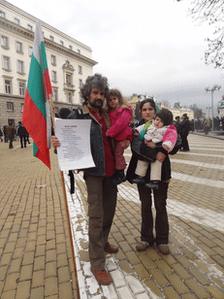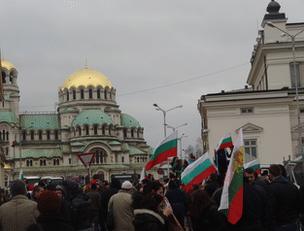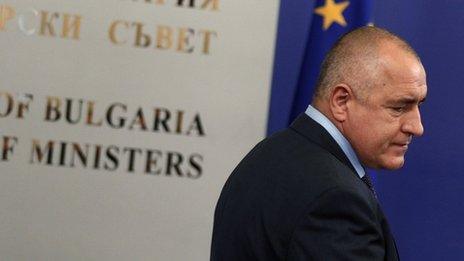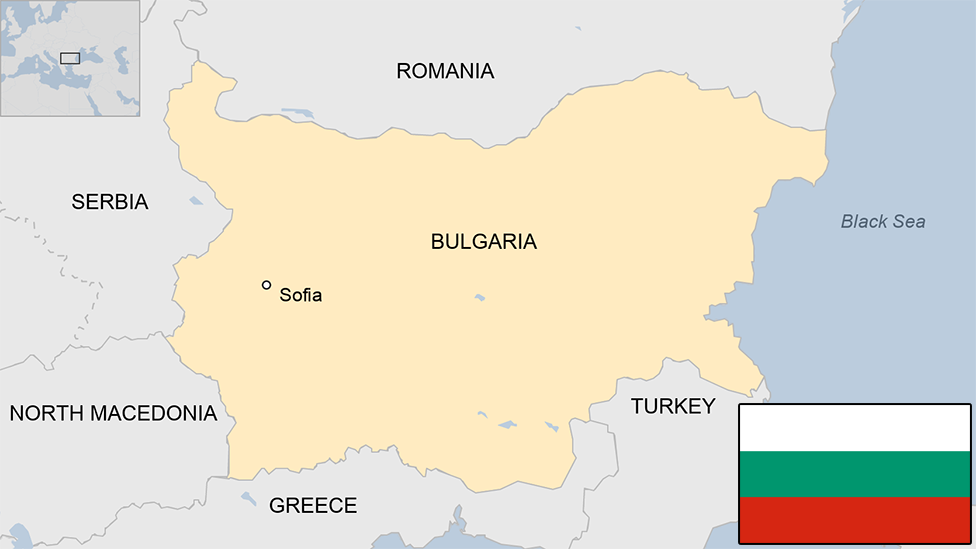Bulgarian politics back on the streets
- Published

Vihren, a psychologist, attended Sunday's rally with his family
A week of turmoil in Bulgaria has seen politics spill out of parliament and on to the streets again.
Nodding quietly on the television screens, Bulgarian President Rosen Plevneliev looks perplexed.
With good reason. Prime Minister Boiko Borisov has resigned and taken with him his entire cabinet. The opposition Socialists and third-placed Movement for Rights and Freedoms demand early elections in late April or early May.
But the tens of thousands of Bulgarians whose street protests brought down the government insist that the parliament stay in place long enough to enact basic reforms which would fundamentally change Bulgarian democracy.
The riot police outside the parliament building seem uncertain whether they are there to stop protesters getting in, or to help the protesters stop the deputies getting out.
Fortunately for the president and the police, Bulgaria has long experience with street protests, caretaker governments and new political movements.
'No change'
In 1997 the Socialist government fell after weeks of street barricades and hyper-inflation. The former King, Simeon of Saxe-Coburg-Gotha, swept to parliamentary victory in the 2001 election, but never quite settled into the prime minister's chair.
Boiko Borisov's GERB - Citizens for the European Development of Bulgaria - won a handsome victory in 2009 with promises to root out corruption and end poverty - neither have succeeded.
"You could say that the fall of the government shows how responsive to the will of the people Bulgarian democracy is," said Daniel Smilov of the Centre for Liberal Strategies in Sofia.
"But from the point of view of those who want lower bills and higher incomes, nothing has changed. If anything, the situation has deteriorated. There is no address to whom to deliver the message."
While some commentators suggest that the prime minister's resignation was cowardly, others say he had no choice, and that Bulgaria would have faced a real revolution this week if he had clung on any longer.

Thousands marched in Sofia on Sunday
As the prime minister, a former bodyguard, came down the steps of parliament after the National Assembly approved the fall of his government, he looked apprehensive, even frightened.
He headed first towards his own stalwart supporters, got entangled with a group of reporters and security men, headed back towards the building, then reluctantly shook hands with a few fans.
Moments before, he had accused the leader of the mostly Turkish Movement for Rights and Freedoms of taking part in a plot to assassinate him. It later turned out that the alleged plot was eight years old. The former head of the secret services accused the prime minister of bandying state secrets around the floor of parliament.
'Getting carried away'
"The people on the streets range from the poorest, to the middle classes," said Angelo Slavchev, 31, one of three young men catapulted to prominence by the demonstrations.
He was chosen by a loose assembly of protest organisers from 30 Bulgarian cities which met last weekend in the central town of Sliven.
What does he think of the violence by some in the crowds, which led to bloody clashes with riot police a week ago? I asked.
"We conducted our own enquiry," he said.
"Our conclusion was that it was youths who got carried away. It won't happen again - we proved that on Sunday."
Tens of thousands marched through Sofia and other cities that day, in the biggest show of strength since the government fell.
The task facing Angelo Slavchev and his fellow organisers of the protests looks as daunting as that faced by the president - how to keep the momentum of the street protests, and how to channel all the demands of the streets into a programme. "We will not form a political party," he insists.
Socialist boost
In Socialist Party headquarters in Pozitano Street, Sergei Stanishev, the party leader and Bulgaria's prime minister from 2005 to 2009, chose his words carefully.
"We are in favour of a radical change, for a democratic and social Bulgaria," he told the BBC.
"The democratic achievements of the past two decades, including the building of civil society and a welfare state, was dismantled by this government.
"The thousands on the streets do represent an important part of society but there are many other people who have party-political sympathies. And for the first time, we are leading in the polls."
Vihren, a psychologist who joined the protest on Sunday with his wife Maja and two daughters, said: "I came here today for truth, for liberty and for justice.
"Especially justice, because this is a big problem in our society."
- Published20 February 2013

- Published20 January
